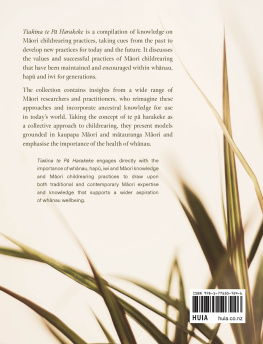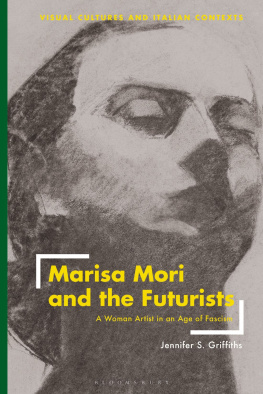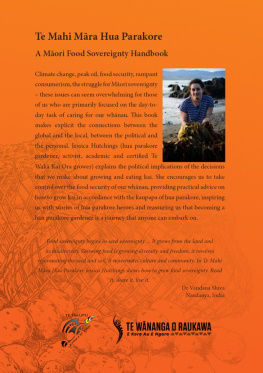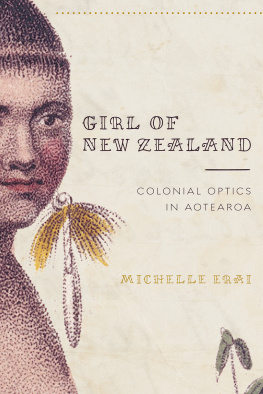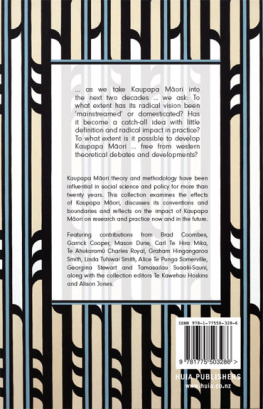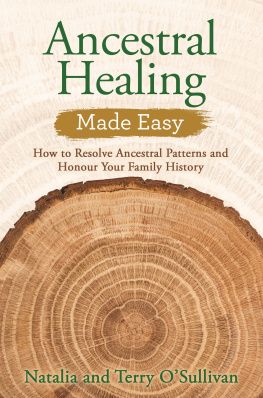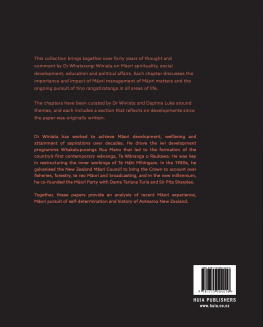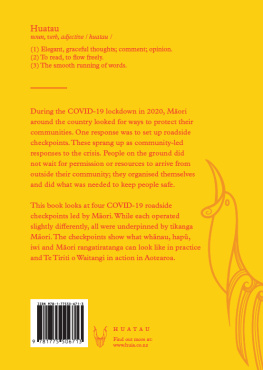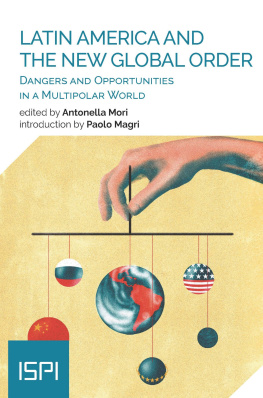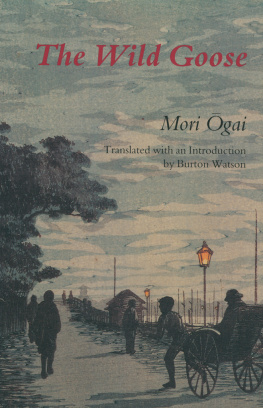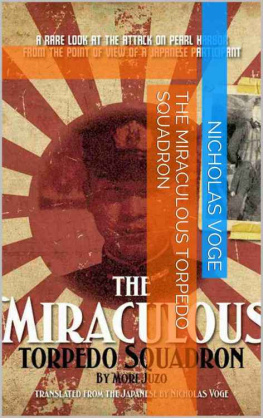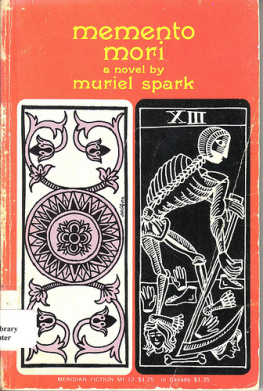


First published in 2022 by Huia Publishers
39 Pipitea Street, PO Box 12280
Wellington, Aotearoa New Zealand
www.huia.co.nz
ISBN 978-1-77550-724-6 (print)
ISBN 978-1-77550-794-9 (ebook)
Copyright the authors 2022
Front cover image Erica Sinclair 2022
This book is copyright. Apart from fair dealing for the purpose of private study, research, criticism or review, as permitted under the Copyright Act, no part may be reproduced by any process without the prior permission of the publisher.
A catalogue record for this book is available from the National Library of New Zealand.
Published with the assistance of

Ebook conversion 2022 by meBooks
Leonie Pihama and Jenny Lee-Morgan
Leonie Pihama
Donna Campbell
Leonie Pihama, Naomi Simmonds and Waikaremoana Waitoki
Ngaropi Cameron-Raumati
Hineitimoana Greensill, Leonie Pihama and Hri Manuirirangi
Glenis Philip-Barbara and Hiria Barbara
Jenny Lee-Morgan
Marjorie Beverland
Erana Hond-Flavell, Aroaro Tamati, Will Edwards, Ruakere Hond, Gareth J. Treharne, Reremoana Theodore, Richie Poulton and Mihi Ratima
Naomi Simmonds and Teah Carlson
Tanya White
David Tipene-Leach and Sally Abel
Paula Toko King, Donna Cormack and Mark Kpua
Andre McLachlan and Waikaremoana Waitoki
Kei ng prekereke huri noa i ng motu e tupu whakaritorito ai ng p harakeke muri nei, he whakamiha noa ake tnei i a koutou. E tangi wiwini ana, e te tangi wawana ana te ngkau khukihuki i ng tini aitu o te w e hingahinga mai n. E noho mwai rokiroki ana te punga nehenehe i te korenga o ng kk tarahae o te pae kua riro ki tua o Paerau ki te huinga o te kahurangi ka oti atu koutou. Tn hoki koutou e whakatupuria ana ttou tamariki me ttou mokopuna ki te hua o te rengarenga, , e whakapakari ana i ttou whakareanga ki te hua o te kawariki e matomato ai te tupu o ng mhuri i roto i ng tini whakawai kei mua i a rtou. , ka whakatairangatia te krero, m te ngakingaki mua e tupu, e rea, e puwai ai ng hua pp, , pihipihi ake nei, pihipihi ake nei.
We would like to acknowledge the many people who participated in all of the research projects and programmes that form the basis of many of the chapters published here. In particular, to all of those who attended hui and wnanga; those who were interviewed; those who have worked to bring wellbeing to our tamariki, mokopuna and their whnau, hap and iwi. All too often, we hear that it takes a p (village) to raise a child, and as we see in the writings here, it is a particular kind of p that provides the collective support and responsibility that we need to ensure the wellbeing of current and future generations.
We wish to acknowledge all who have provided support, guidance and advice for the projects Tiakina te P Harakeke and Te Taonga o Taku Ngkau. The research projects that provided the inspiration for this publication have been funded by Ng Pae o te Mramatanga, the Health Research Council, A Better Start National Science Challenge and Cure Kids. We acknowledge that a number of authors and research teams involved with contributing chapters have also received support for their work. Cure Kids again supported the publication of this book and has actively encouraged work, such as that included in this book, to be distributed widely. We acknowledge the support of the University of Waikato, in particular Professor Linda Tuhiwai Smith, who has been an advisor to all of our work, and the operations and business team who supported us during our time at Te Kotahi Research Institute: Herearoha Skipper, Papahuia Dickson and Tammy Tauroa. Many thanks to the kaimahi, especially Catherine Page and Ngahuia Eruera of Ng Wai a te T Mori and Indigenous Research Centre, and Tuapapa Rangahau Research and Postgraduate Office, Te Whare Wnanga o Wairaka, Unitec who have assisted in the final stages to ensure the publication of this book.
Our appreciation to all of our whnau who have provided ongoing support and encouragement throughout the work that has been done to not only bring this publication together but all of the many projects and studies that are documented here. We also acknowledge the contributing authors for their agreement to publish chapters on their work in the area of Kaupapa Mori research, tamariki and whnau ora to enable a wider inclusion of work that can inform, support and affirm our people.
Our acknowledgement to Eboni Waitere and the team at Huia Publishers who were supportive of this book from its conception and who have made the publication process a stress-free experience in what is a stressful time in the world as we all work to keep our tamariki, mokopuna and whnau safe throughout the COVID-19 pandemic.
Ng manaakitanga.
Leonie Pihama
Jenny Lee-Morgan
This book is concerned with the role of healthy whnau (extended family structure) relationships in the raising of tamariki (children). It is about how our tpuna (ancestors) have passed to us mtauranga Mori (traditional knowledge), in its many forms, which provide us with guidance as Indigenous Peoples in this contemporary world. Di Grennell (2006), a longterm worker in the area of Family Violence prevention has highlighted this in her work:
Drawing on the wisdom of our tpuna and traditions is not to return us to a mythic past or golden age our people have always adapted to new circumstances and experimented with new technology. Rather it is to understand and be guided by the symbols, values and principles that can enhance our capacity to live together peacefully as whnau and communities. Our capacity for resilience as an indigenous people is fed and nourished by our language, traditional practices and oral traditions (p. 1).
Tiakina te P Harakeke: Ancestral Knowledge and Tamariki Wellbeing brings to the fore discussions of successful values and practices of Mori childrearing that have been maintained within many whnau, hap and iwi for generations. It is a sharing of knowledge that supports the belief held by our tpuna that our tamariki and mokopuna (grandchildren) are treasured parts of whnau, hap and iwi, as is expressed in the saying He taonga te mokopuna. This knowledge comes in the form of a wide range of Mori research projects and discussions that are grounded upon and which reveal the significant privileging of ancestral knowledge to inform our contemporary understandings of wellbeing for tamariki and mokopuna.
Over the past thirty years there has been a return to a focus on the role of whnau as a site of wellbeing for Mori. This has focused upon providing access to the wisdom, knowledge and approaches, grounded within mtauranga Mori, that support whnau, and those organisations working alongside whnau, to shape positive outcomes and experiences for Mori. Tiakina te P Harakeke explores a range of contexts that include examples of how our tpuna believed, lived and acted within Mori cultural frameworks of traditional childrearing. Historical documentation about early contact indicates Mori children were indulged by all generations of a whnau and hap (Hohepa, 1994). It is clear that physical punishment was unacceptable in the raising of Mori children and therefore there were particular approaches that ensured such discipline was not required. Whnau relations were traditionally embedded within wider hap and iwi structures and therefore whnau resiliency was also embedded in wider collective and collaborative responsibilities and support.
Next page
